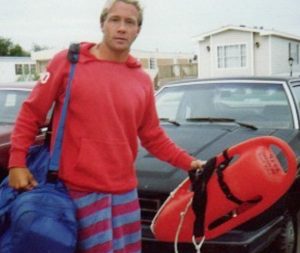
(Editor’s Note: The following is a series on the men and women who have spent their summers protecting all those who came to Ocean City for fun and safe vacation.)
OCEAN CITY — Things did not look promising for Wesley Smith as the summer of 1989 approached. He was living in Bel Air and had just dropped out of high school.
With not a lot more than desire, he headed to Ocean City to live at the beach and join the beach patrol. The test one takes to even be considered for the OCBP starts with an early morning swim in the bone chilling waters at the inlet. Wesley, like all the others before him, would have to swim from the rock piles at the southern most point of the beach, around the pier and race up the sand to the finish line. He’d have 10 minutes. If he didn’t make it, his plan for being a guard would be over.
“When I took the test, I was the last to pass. Literally. I remember Captain Schoepf calling out times as I was dashing out of the water at the pier. He yelled ‘9:55.’ And then, about 30 seconds later, he yelled ‘9:58.’ Roughly 10 seconds later, as I plunged across the line, he announced ‘10 minutes.’ The truth was, the patrol was hurting for people, and the captain let me slide. My old Timex told me it was more like 10:35 for the swim.”
Wesley was on his way to his first summer as a guard. He probably didn’t realize at that moment just how far this journey with the beach patrol was going to go or how much this “10 minute” swim was going to change his life. But that summer job he started helped give him focus and purpose as he pursued his dreams over the next 22 summers. Wesley guarded the crowded beaches of “condo row” for several summers before being promoted to Sergeant in 1994 and then to Lieutenant three years later.
It was as a lieutenant that Wesley had one of his most memorable rescues.
“I had to make an off-duty rescue of five people without a buoy. At about 8 a.m. that morning, I went for a long run from 78th Street to the Inlet,” he said. “On the way back, as I was around Surf Avenue, I saw two heads together at the tail end of a long rip off the 14th Street rocks. I started to sprint to 14th Street when I noticed two kids around 10-12 years old yelling for help, one practically holding the other underwater.”
Wesley recalled, “As I started swimming out, two men from the beach, trudged into the rip to help, but immediately found themselves in trouble. I had to cross chest carry one kid and hold the other under his armpit as I scissor kicked to the two men who were now in danger too. I noticed a surfer about a block away and called them to paddle over. Unfortunately, it was a cheap rental surfboard, and the surfer turned out to be a young kid who didn’t know what he was doing. I had all of them grab the board, and I put the leash on my ankle and swam to the sandbar around the rocks.”
“Once we got in to shore, fire trucks were pulling up, and rescue team members were running out in boots on the beach, carrying a landline. Fortunately, they didn’t need to use it, and all the victims were okay. The two men needed oxygen, but everyone was safe. It made the national news,” he said.
Wesley’s long career with the OCBP took him much farther than water rescues.
“Mentally and emotionally, the beach patrol helped me significantly. After joining OCBP, I eventually earned my GED, my Bachelor’s degree, my Master’s, and my PhD with tuition-paid fellowships. And I maintained a 4.0 GPA all through college. In summary, I entered the beach patrol aspiring to get a GED and left with a Ph.D. and no college debt. Toward the tail end of my OCBP career, I became a professor at the University of Miami in 2004, where I direct the most popular pre-med program on campus.”
Additionally, the OCBP would name Wesley the director of training, allowing him to “revamp the training academy and create a detailed beach patrol manual.” Wesley was also proud of founding and directing the Ironguard Triathlon.
His time on the patrol would come to an end by 2010. Like so many before him, life forced him to make a difficult decision.
“The only thing I loved more than the job was being a father,” he said. “I realized the split life of being a professor in Florida during the winter and a Maryland beach patrol lieutenant in the summer was not good for my son and my future children. Unfortunately, I had to retire, at least until my kids go to college. And since I have a new baby girl, I guess I will return when I’m 70.”
Wesley lives in Islamorada, Fla. and is certain that “without joining the beach patrol, I’d never be helping run a healthcare company or teaching future doctors at a major academic institution.”
And all this because of a 10-minute swim.
